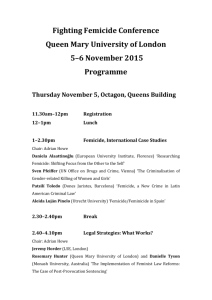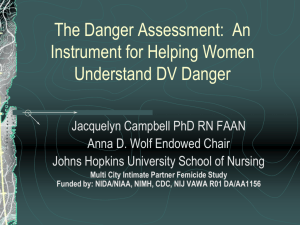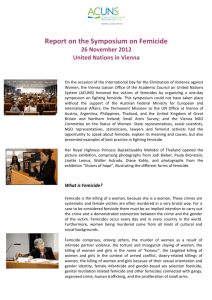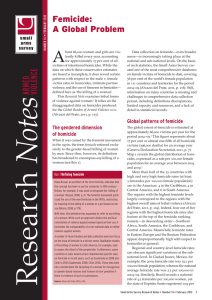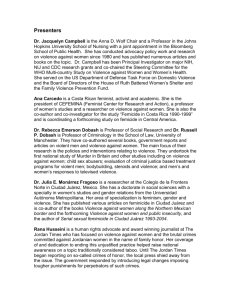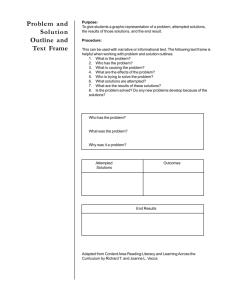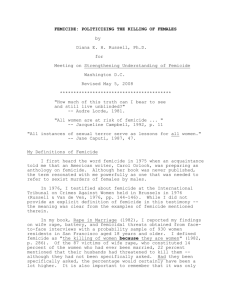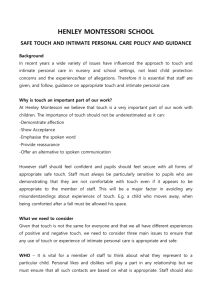PPT - IGWG
advertisement
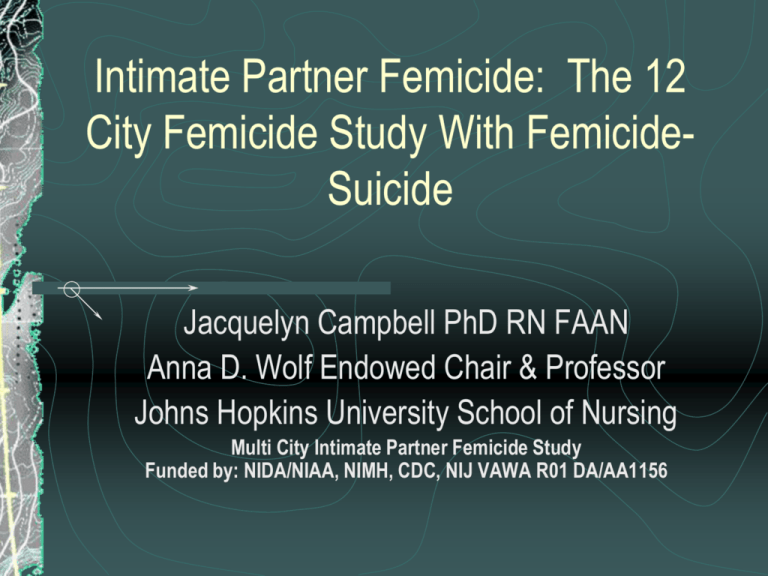
Intimate Partner Femicide: The 12 City Femicide Study With FemicideSuicide Jacquelyn Campbell PhD RN FAAN Anna D. Wolf Endowed Chair & Professor Johns Hopkins University School of Nursing Multi City Intimate Partner Femicide Study Funded by: NIDA/NIAA, NIMH, CDC, NIJ VAWA R01 DA/AA1156 HOMICIDE IN BATTERING RELATIONSHIPS 40 - 50% OF US WOMEN KILLED BY HUSBAND, BF OR EX (vs. 5-8% of men) (9 times rate killed by a stranger) 7th leading cause of premature death for US women; #2 cause of death-African & Native American women 15-34 yo Immigrant women at increased risk in NYC (Wilt ’04) US – At least 2/3 of women killed – battered prior – if male killed – prior wife abuse in 75% of cases (Campbell, ‘92; Morocco et al, ‘98) More at risk when leaving or left (Wilson & Daly, ‘93; Campbell et. al. ’01; Websdale ‘99) – 1st 3 mos & 1st year - but eventually more safe Women far more likely victims of homicide-suicide (29% vs.1% male-US–29.3 vs. 2.3%-Canada) 40% - Ontario (DVDRC ‘06) 44-47% of women killed seen in health care system before killed (Sharps, Campbell ’02; Wadman & Muelleman ‘99) INTIMATE PARTNER FEMICIDE BY PERPETRATOR IN TEN CITIES (N= 311) (same sex intimate femicides – Glass et al., 2004) EX-BF EX-SPOUSE 8.0% BOYFRIEND 29.6% 19.3% OTHER 2.6% SPOUSE 40.5% U.S. INTIMATE PARTNER HOMICIDE RATE DECLINE 1976-06 FBI (SHR, 1976-02; BJS ’05, ‘07) 1800 1600 1400 1200 FEMALE 1000 800 600 400 MALE 200 20 04 20 02 20 00 19 96 19 94 19 92 19 90 19 88 19 86 19 84 19 82 19 80 19 78 19 76 0 2004, 05 - no ex’s Decline in Intimate Partner Homicide and Femicide Decline in male victimization in states where improved DV laws and services - resource availability (Browne & Williams ’89; ’98, Dugan, Nagin, & Rosenfeld ‘99) Exposure reduction - increased female earnings, lower marriage rate, higher divorce rate (Dugan, Nagin & Rosenfeld ’99; Smith & Brewer ’90) Gun availability decline (Wilt ‘97; Block ‘95; Kellerman ‘93, ‘97- gun increases risk X3) – special issue of Evaluation Review ’06 – Sorenson, Special Editor Decrease by Race - Intimate Homicide Rate By Race Age 20-44 FBI, (SHR), 1976-96 20 15 10 5 A.A. Female A.A. Male Anglo Female 0 Anglo Male 76 977 978 979 980 981 982 983 984 985 986 987 988 989 990 991 992 993 994 995 996 997 998 999 000 9 1 1 1 1 1 1 1 1 1 1 1 1 1 1 1 1 1 1 1 1 1 1 1 1 2 U.S. INTIMATE PARTNER HOMICIDE RATES & DOMESTIC VIOLENCE SERVICES 1976-9 (Resources per 50 million - Dugan, Nagin & Rosenfeld ‘03) 4000 3500 3000 2500 IP Homicides Hotlines Legal Advocacy 2000 1500 1000 500 2000 1998 1996 1995 1994 1993 1992 1991 1990 1989 1988 1987 1986 1985 1984 1983 1982 1981 1980 1979 1978 1977 1976 0 INTIMATE PARTNER HOMICIDE: KILLED BY GUNS US ‘76-’02 (SHR) (>2/3 of intimates) 2500 2000 With Guns 1500 1000 500 Without Guns 00 20 95 19 90 19 85 19 80 19 19 76 0 Early work on Femicide Dayton, OH study on IP homicide – 28 women & 26 men killed by intimate partners – prior DV in 66% of female cases; 75% of male (Campbell ‘81 & ’92) Several women seen in local ED’s before killed Others – police called but nothing done Power and control issues clear in reports Further work developing and refining and testing Danger Assessment (Campbell ‘86; ’89; ‘92 - & ‘08) Femicide Risk Study (Funded by: NIDA/NIAA, NIMH, CDC, NIJ VAWA R01 DA/AA1156) Purpose: Identify and establish risk factors for IP femicide – (over and above domestic violence) Significance: Determine strategies to prevent IP femicide – especially amongst battered women – Approximately half of victims (54% of actual femicides; 45% of attempteds) did not accurately perceive their risk – that perpetrator was capable of killing her &/or would kill her RISK FACTORS FOR INTIMATE PARTNER FEMICIDE: RESEARCH TEAM (Funded by: NIDA/NIAA, NIMH, CDC, NIJ VAWA R01 DA/AA1156) R. Block, PhD (ICJA) D. Campbell, PhD, RN (FSU) J. McFarlane, DrPH, RN (TWU) C. Sachs MD, MPH (UCLA) P. Sharps, PhD, RN (GWU) Y. Ulrich, PhD, RN (UW) S. Wilt, PhD (NYC DOH) F. Gary, PhD, RN (UFl) M.A. Curry PhD, RN (OHSU) N. Glass, PhD, RN (OHSU) J. Koziol-McLain, PhD, RN (JHU) J.Schollenberger MPH (JHU) A. Kellerman, MD, MPH (Emory) X. Xu, MSN (JHU) Kathryn Chouaf, MSN (JHU) RISK FACTORS FOR INTIMATE PARTNER FEMICIDE: CITIES AND CO-INVESTIGATORS (Funded by: NIDA/NIAA, NIMH, CDC, NIJ VAWA R01 DA/AA1156) Baltimore Chicago Houston Kansas City, KA&MO Los Angelos New York Portland, OR Seattle, WA Tampa/St. Pete Wichita, KA P. Sharps (GWU) B. Block (ICJA) J. McFarlane (TWU) Y. Ulrich (UW) C. Sachs (UCLA) S. Wilt (NYDOH) M. A. Curry (OHSU) Y. Ulrich (UW) D. Campbell (FSU) Y. Ulrich (UW) Case Control Design Data Source CASES - women who are killed by their intimate partners Police Homicide Files Proxy informants CONTROLS - women who are Women themselves physically abused by their intimate partners (second set of nonabused controls – for later analysis) Addition of Attempted Femicides Data Source CASES - women who are killed by their intimate partners Police Homicide files Proxy informants CONTROLS - women who are physically abused by their intimate partners CASES - women who are ALMOST killed by their intimate partners Women themselves Women themselves – to address issue of validity of proxy information Definition: Attempted Femicide GSW or SW to the head, neck or torso. Strangulation or near drowning with loss of consciousness. Severe injuries inflicted that easily could have led to death. GSW or SW to other body part with unambiguous intent to kill. If none of above, unambiguous intent to kill. PRIOR PHYSICAL ABUSE & STALKING EXPERIENCED ONR YEAR PRIOR TO FEMICIDE (N=311) & ATTEMPTED FEMICIDE (N=182) Prior physical abuse Increased in frequency Increased in severity Stalked No prior physical abuse Stalked Femicide Attempted 70% 66% 62% 87% 72% 54% 60% 95% 30% 58% 28% 72% INTIMATE PARTNER ABUSED CONTROLS (N = 356) Random sample selected from same cities as femicide and attempted femicide cases Telephone survey conducted 11/98 - 9/99 using random digit dialing Women in household 18-50 years old & most recently celebrated a birthday Women abused (including sexual assault & threats) by an intimate partner w/in 2 years prior – modified CTS Safety protocols followed Sample – (only those cases with prior physical abuse or threats) FEMICIDE CASES Number 220 ATTEMPTED FEMICIDE CASES 143 ABUSED CONTROLS 356 Sociodemographic comparisons 90 80 70 60 Fem/Att. Perp Abuse Perp Fem/Att. Victim Abuse Victim 50 40 30 20 10 0 Af/Am Anglo Hispanic <HS Ed Job Mean Age Fem/Att Perp = 36 Abuse Perp = 31 Fem/Att Victim = 34 Abuse Victim = 29 DANGER ASSESSMENT ITEMS COMPARING ACTUAL & ATTEMPTED FEMICIDE SURVIVORS (N=493) & ABUSED (WITHIN PAST 24 MONTHS) CONTROLS (N=427) (*p < .05) Att/Actual 56% Physical violence increased in frequency* Physical violence increased in severity * 62% Partner tried to choke victim * 50% A gun is present in the house * 64% Partner forced victim to have sex * 39% Partner used street drugs * 55% Partner threatened to kill victim * 57% Victim believes partner is capable of killing 54% her * 16% Perpetrator AD Military History (ns.) 4.6 Stalking score* Control 24% 18% 10% 16% 12% 23% 14% 24% 22% 2.4 VICTIM & PERPETRATOR OWNERSHIP OF WEAPON IN FEMICIDE (N = 311), ATTEMPTED FEMICIDE (N = 182), ABUSED CONTROL (N=427) & NON-ABUSED CONTROL (N=418) CASES Femicide Attempted Abused control Nonabused control 74.1 80 70 60 52.9 50 40 26.8 30 20 15.7 14.6 16.9 15.6 12.7 10 0 Victim Perpetrator 2=125.6, P< .0001 DANGER ASSESSMENT ITEMS COMPARING ACTUAL & ATTEMPTED FEMICIDE SURVIVORS (N=493) & ABUSED (WITHIN PAST 24 MONTHS) CONTROLS (N=427) (*p < .05) Att/Actual Control Partner is drunk every day * 42% 12% Partner controls all victim’s activities * 60% 32% Partner beat victim while pregnant * 36% 7.7% Partner is violently jealous of victim (says 32% things like “If I can’t have you,no one can”)* 79% 7% 9% Victim threatened/tried to commit suicide 19% Partner threatened/tried to commit suicide * 39% 9% 3% Partner is violent toward victim’s children* Partner is violent outside house* 49% 38% Partner arrested for DV* (not criminality) 27% 15% Partner hurt a pet on purpose 10.1% 8.5% Nonsignificant Variables of note Hurting a pet on purpose -10% of attempteds/actual victims vs. 8.5% of controls BUT – some clear cases of using cruelty to a pet as a threat to kill WAS a risk for women to be abused (compared with nonabused controls) (AOR = 7.59 – Walton-Moss et al ’05) AND more (but still not sign.) risk in attempted femicide sample – perhaps proxies not as knowledgeable about pets – warrants further investigation Perpetrator military history – 16% actual/attempteds vs. 22% of controls Risk Models Femicides with abuse history only (violence & threats) compared to abused controls (*N=181 femicides; 319 abused controls – total = 500 (18-50 yo only) Missing variables variables had to be excluded from femicide model due to missing responses – if don’t know – no – therefore underestimate risk Logistic Regression Plan – comparing cases & controls Model variable in blocks – background characteristics – individual & couple, general violence related variables, violent relationship characteristics – then incident level Interaction terms entered – theoretically derived Significant (p<.05) Variables (Entered into Blocks) before Incident (overall fit = 85% correct classification) Perpetrator unemployed Perpetrator gun access Perpetrator Stepchild Couple Never Lived Together Highly controlling perpetrator Estranged X Low control (interaction) Estranged X Control (interaction) Threatened to kill her Threatened w/weapon prior Forced sex Prior Arrest for DV OR = 4.4 OR = 5.4 OR = 2.4 OR = .34 OR = 2.1 OR = 3.6 OR = 5.5 OR = 3.2 OR = 3.8 OR = 1.9 OR = .34 Femicide – Suicide Cases (32% of femicide cases in study – 29% US) Significant explanatory power for same femicide – suicide risk factors. Partner access to gun Threats with a weapon, choking Step child in the home Estrangement Unique to femicide – suicide: Partner suicide threats – history of poor mental health Married Somewhat higher education levels (unemployment still a risk factor), more likely to be white, Hispanic or Asian (vs. African America) but not significant in multivariate Multicity Femicide Study – Results related to pregnancy 25.8% of women killed reported abuse during pregnancy (vs. 8.4% of abused controls) – AOR = 3.8 13 women (4.2%) killed while pregnant – 11 of 13 abused in relationship before killed Stepchild in home AOR = 2.48 Results specific to pregnancy published: (McFarlane, Campbell et. al. ’02 OB/GYN, 100: 27-36; also Campbell, Webster et. al. AJPH ’03) From Public Health Perspective – Maternal Mortality Maternal mortality – Death from all causes during pregnancy & year after delivery or pregnancy termination Homicide - leading cause of maternal mortality in US cities where measured (NYC, Chicago, DC) (Dannenberg, ’95; Krulewitch ‘01) Leading cause of maternal mortality in entire state of MD (Horon & Cheng, 2001) – 20% of deaths Has been neglected in maternal death reviews – (perpetrator data missing) & therefore programming in US but fatality reviews increasing St. George – Washington Post – 12/04 1237 documented DV maternal mortalities since ’90 - 88 per yr (vs. 1200+ DV Maternal Mortality Worldwide Homicide shown to be an important cause in other countries also – e.g. Mozambique, Bangaledesh (Fauveau & Koenig,’88) Maternal deaths in developing countries – ongoing and serious problem –e.g. in India – 13% of deaths of women – 4-5.5 per 1000 live births (WHO) but % related to IP homicide not documented 400 villages Maharastra State (Pune, Aurangabad & Ahmednagar districts) India – hand review of records 16% of all deaths during pregnancy due to IPV; 70% of maternal deaths in region unrecorded & 41% of recorded deaths misclassified (Ganatra et. al. ’98) Lessons learned Importance of proxy informants – otherwise NEVER get true incidence of prior DV Importance of hand search of police records – miss many cases otherwise Importance of homicide-suicides – need for further study Importance of maternal mortality – data base disconnect Importance of attempted femicides victims as sources of data Never forget who it’s for “please don’t let her death be for nothing – please get her story told” (one of the Moms)
